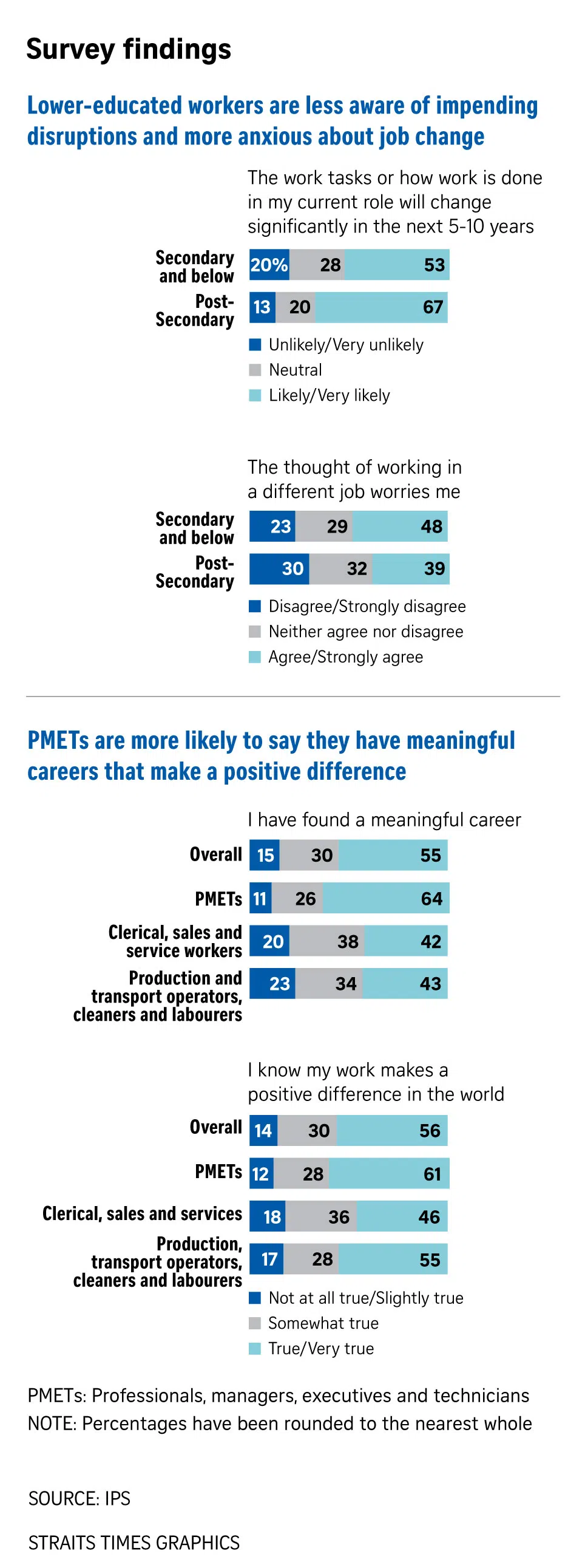Less-educated Singaporeans at risk of falling behind as jobs change: IPS study
Sign up now: Get ST's newsletters delivered to your inbox

The report pointed out that for decades, Singapore has placed emphasis on knowledge work over technical and services jobs.
PHOTO: ST FILE
SINGAPORE – Tough times lie ahead for Singapore’s less-educated workers.
They are less aware of technological disruptions, less open to workplace changes, and less adept at getting themselves trained.
Compared with degree holders, workers with secondary education at most are also more anxious about changing jobs.
In a nutshell, they are more likely to be displaced by automation and digitalisation relative to their more-schooled peers, said a study released by the Institute of Policy Studies (IPS) on Monday.
This group of workers, comprising 27 per cent of the 2.3 million local workforce, needs help, the researchers said.
So while eight in 10 local workers from lower social brackets said they have moved up in life since childhood, at risk is their future ability to do so.
Dr Laurel Teo, who co-led the research with Dr Chew Han Ei, said: “If we don’t do anything about these gaps and vulnerabilities, I am not sure how much further we can continue to enjoy such social mobility.”
The survey of 1,010 local workers last October sheds light on the Singapore workforce’s preparedness for the future of work, its work aspirations and perceptions of social mobility.
The report pointed out that for decades, Singapore has placed emphasis on knowledge work over technical and services jobs – also known as blue-collar jobs – that are occupied by 20 per cent of Singapore’s 3.5 million-strong labour force.
Hence, despite being lauded as “essential workers” during the pandemic,
In contrast, more than six in 10 PMETs (professionals, managers, executives and technicians) believe so.
Excluding foreign workers, degree holders comprise 41 per cent – the biggest group – of the local workforce.
Like it or not, bias over paper qualifications remains, said Mr Jansen Gwee, founder of recruitment platform OppTy. “Having been a recruiter for over a decade, I see the struggle and challenges faced by lower-schooled workers.
“This is due in large part to three elements – the threat of them being replaced by lower-wage foreign workers, the glass ceiling that we have for those without diploma or degree qualifications, and the lack of social protection and safety net for this group.”

Unprepared for change
Just the thought of a job change can be difficult for them, as many of these workers live from pay cheque to pay cheque, he added.
“All too often, it is easy for them to get caught in this Catch-22 situation – they want to upgrade themselves, but employers are hesitant to consider them as they don’t have at least a diploma,” said Mr Gwee.
It is important for blue-collar workers to thrive, said Assistant Professor Chong Sin Hui from Nanyang Technological University (NTU), even if they make up only a slice of the local workforce. They are usually more affected in economic downturns as they can easily be displaced and require more state aid, she said.
Their children are also less likely to get opportunities and resources, which reinforces the national income and social inequality, making social mobility even more difficult, she added.
Associate Professor Trevor Yu from NTU agreed, saying: “A significant portion of them are in jobs that are particularly susceptible to automation or significant disruption in the near future.”
In October last year, Deputy Prime Minister Lawrence Wong acknowledged that Singapore has not sufficiently valued workers engaging in “hands-on and heart work”.
Businesses should play a big part in social mobility by promoting meritocracy in hiring, training staff and paying fair wages to their employees, said Mr Gwee. But the realities of inflation and the challenging business climate, especially this year, mean their role will be crimped.
“This issue of improving social mobility is one that has to be addressed on a governmental level,” he said.
Lacking core skills
The survey also shows fewer than half of local workers actively pursue critical core skills such as creative thinking, career planning and networking.
Fewer women, in particular, said they network, get training for themselves outside their organisations, or strive to get credit for their work. They are also less likely to enjoy a creative job, such as coming up with new products, services or work procedures.
The same could be said for workers with secondary-level education or below. The fact that most non-PMETS do not find meaning in their work is also a cause for concern, as this has significant implications for work motivation, performance and, ultimately, the satisfaction and sense of fulfilment that people derive from their work.
“To continue to ensure social mobility going forward, these areas of vulnerabilities will need to be addressed,” said the report.
Across generations and races, one thing that Singaporean workers agree on is the importance of including people with mental health conditions or disabilities at the workplace.
Awareness has been growing that these workers can be productive given support, and having them boosts the image of an inclusive workplace, which helps raise employers’ attractiveness to talent, said Prof Yu.
Calling it a personal hope, Dr Chew said he hopes that this survey shows where government intervention and resources can reduce creeping social inequalities.
“It is heartening to see that now there is the political will to value vocational work – the hands-on and heart work. When there is political will, society can move forward together,” he said.



